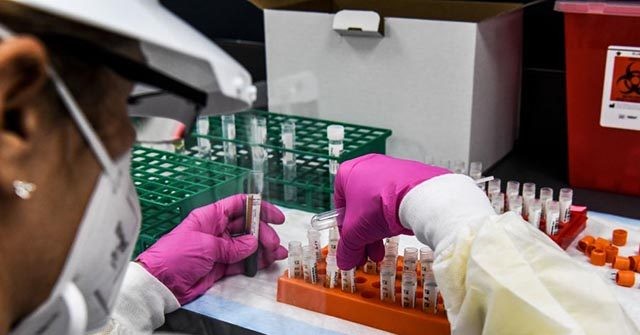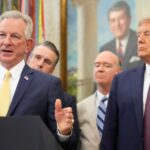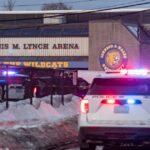

The federal government failed to notice an unlicensed bio lab in Reedley, California, which stored many communicable diseases and was created by a fugitive Chinese citizen with close ties to China’s government, according to a congressional report.
The report by the House Select Committee on the Chinese Communist Party also said that President Joe Biden’s Centers for Disease Control and Prevention spent at least two months ignoring pleas by local officials to examine and contain the disease storehouse. The storehouse contained canisters of deadly viruses and diseases, including Malaria, HIV, tuberculosis, China’s coronavirus, and perhaps, Ebola.
The apparent illegal migrant ringleader was finally arrested in October and charged with fraud crimes, long after he fled from a Canadian court in 2016, and long after he began reportedly selling fraudulent medical products to Americans.
“A disturbing realization is that no one knows whether there are other unknown biolabs in the United States,” said the bipartisan, 42-page report, dubbed “The Reedley Report.”
The federal government rarely tries to learn from its failures, and there is little evidence that the Department of Homeland Security, the Centers for Disease Control and Prevention (CDC), the FBI, or the Federal Trade Commission, are investigating their multi-agency failure. California’s state government also failed to detect the operation until a city inspector in Reedly, CA, discovered an improper water release.
In 2021, Biden’s deputies quickly ended border protections created by former President Donald Trump and then curbed his successful FBI investigations of Chinese spying.
Without federal attention, the investigation was taken up by the House Select Committee on the Chinese Communist Party. The committee is chaired by Rep. Mike Gallagher (R-WI) and was aided by Rep. Jim Costa (D-CA), who pressured the CDC to begin investigating the unsupervised disease laboratory.
The lab, according to the report, was likely a cover for fraud and government-aided economic espionage by a Chinese citizen, Jiabei “Jesse” Zhu.
In 2016, the Canadian government levied a huge fine of more than $330 million for a decade’s worth of intellectual property economic theft in Canada, said the report, which continued:
Zhu appears to have entered the United States unlawfully, given that he was subject to a Canadian arrest warrant. While in United States, he began to operate under the false identity of “David He.”
While living illegally in the United States, and aided by several other Chinese people, the report said, Zhu adopted a new alias and worked as:
the “directing mind” of the UMI corporate [spying] network. Zhu, as “He,” continued to use the same corporations in China and hire many of the same individuals to run his [China-based] operations.
…
The Select Committee’sinvestigation did not produce a complete record of Zhu’s activities in the U.S., but it revealed that Zhu had previously operated a similar unlicensed facility in the city of Fresno, California. At the Fresno location, it appears that Zhu and his associates had rewired the electrical system in a way that may have caused the fire that forced Zhu to flee. When that location was no longer available, Zhu proceeded to find a second potential laboratory and again go through the elaborate process of retrofitting it for his illicit operation. It appears that Zhu has had to move medical equipment, transgenic mice, and apparent pathogens several times over the years, incurring significant costs in the process
The Select Committee has obtained evidence indicating that Zhu and his associates at the Reedley Biolab were purchasing counterfeit test kits from the PRC [China] and re-selling them in the United States as “Made in the USA.”
The downtown lab was discovered during a routine regulatory check in December 2022, but it continued to operate into May 2023 despite myriad violations of safety regulations, health hazards, and shady operators.
The report said:
Local officials spent months repeatedly trying to obtain assistance from the CDC, both directly and through CDPH. According to local officials, the CDC refused to speak with them, and, on a number of occasions, it was reported by local officials that CDC hung up on them mid-conversation. Local officials were similarly unable to get any help from other federal agencies that may have concurrent authority to investigate and/or remediate the biohazardous substances found at the Reedley Biolab.
Ultimately, local officials contacted their local Member of Congress, Representative Jim Costa, asking him for help obtaining federal assistance. It was only then, following Congressman Costa’s advocacy on Reedley’sbehalf, that the CDC responded to California state government and local officials’ requests.
“CDC arrived on site on May 2, 2023, and finished the onsite support on May 4,” or roughly six months after the dramatic discovery, the report said, adding:
Upon reviewing the site, the CDC reported, based on existing labels, that the facility contained “at least 20 potentially infectious agents,” including HIV, Tuberculosis, and the deadliest known form of Malaria. The CDC specifically listed the following pathogens:
… Hepatitis B virus, Hepatitis C virus, Dengue virus, Human Immunodeficiency Virus (HIV) 1 and 2, Human Herpes virus 1 (Herpes simplex virus), Human Herpes virus 5 (Human Cytomegalovirus), Respiratory Syncytial virus, Rubella virus, Severe Acute Respiratory Syndrome Coronavirus 2 (SARS-CoV-2).
But the CDC refused to test many additional containers, many of which were labeled with an undeciphered code, the report said. “Despite their limited local budget, local officials then offered to pay the CDC for the entirety of the cost of testing these samples. They still did not [test] and left the site.”
A local court ordered the city to destroy all the samples, identified or not, including one set marked as the deadly and infectious Ebola disease.
The report noted:
The CDC’s refusal to test any potential pathogens with the understanding that local officials would otherwise have to destroy the samples through an abatement process makes it impossible for the Select Committee to fully assess the potential risks that this specific facility posed to the community. It is possible that there were other highly dangerous pathogens that were in the coded vials or otherwise unlabeled. Due to government failures, we simply cannot know.
The bipartisan, 42-page Reedly Report said:
In December 2022, Code Enforcement Officer Jesalyn Harper noticed a green gardenhose sticking out of a hole drilled into the side of a warehouse located at 850 I Street, right in the heart of Reedley, California.
Reedley is a rural town of 26,000 residents. The house was a clear violation of Reedley’s building code in a building known to be vacant for over a decade. She walked around to the front of the warehouse and knocked on the door. Officer Harper showed her badge and asked to enter the site.
Upon entering, Officer Harper found a vast warehouse filled with laboratory equipment, manufacturing devices, and what appeared to be medical-grade freezers. She observed several individuals who identified themselves as PRC nationals wearing white lab coats, glasses, masks, and latex gloves working inside. As she stepped further into the warehouse, she noticed that some of the freezers and containment units had glass doors. Inside, she saw thousands of vials of biological substances. Many were unlabeled. Others were labeled in a foreign language later identified as Mandarin. Others still were labeled in some kind of code. A few of the vials, however, had labels in English. Some of these labels listed substances that Officer Harper at the time did not recognize. She did, however, recognize the names listed on several labels, such as HIV.
…
Officer Harper referred the matter to Fresno County and the Federal Bureau of Investigation. Approximately two months later according to local officials, the FBI informed her that it had closed its investigation because the Bureau believed that there were no weapons of mass destruction on the property.
The report concluded:
At a minimum, the Reedley Biolab shows the profound threat that unlicensed and unknown biolabs pose to our country. At worst, this investigation revealed significant gaps in our nation’s defenses and pathogen-related regulations that present a grave national security risk that could be exploited in the future.
“It is therefore incumbent upon Congress and the Executive Branch to address these vulnerabilities now before it is too late,” the report said.





